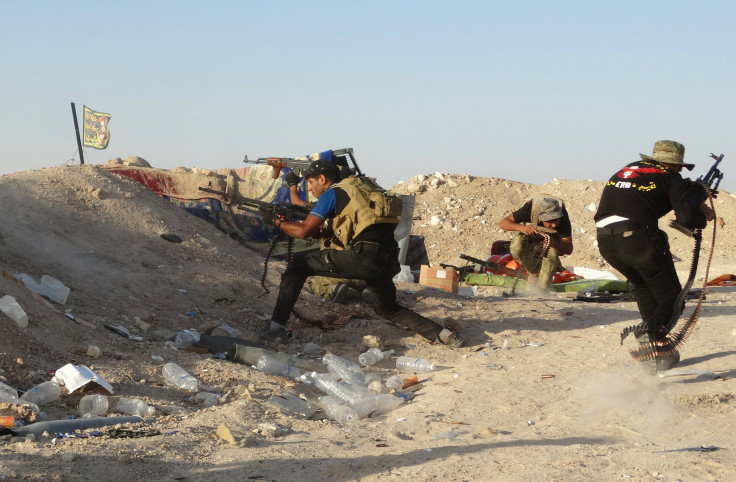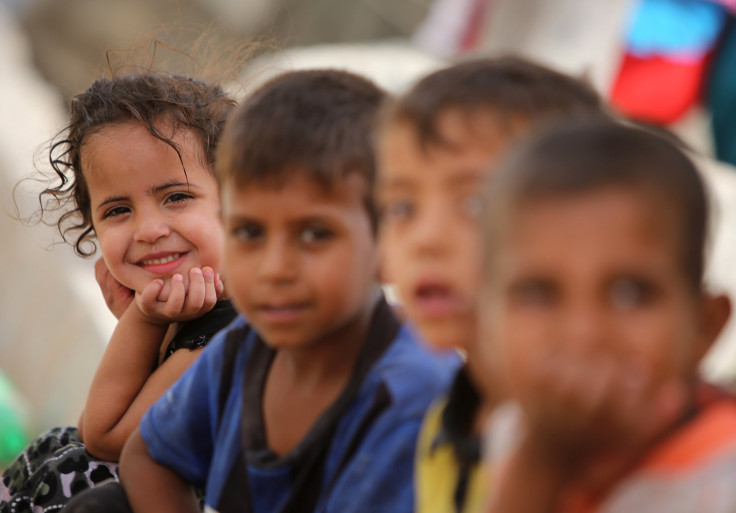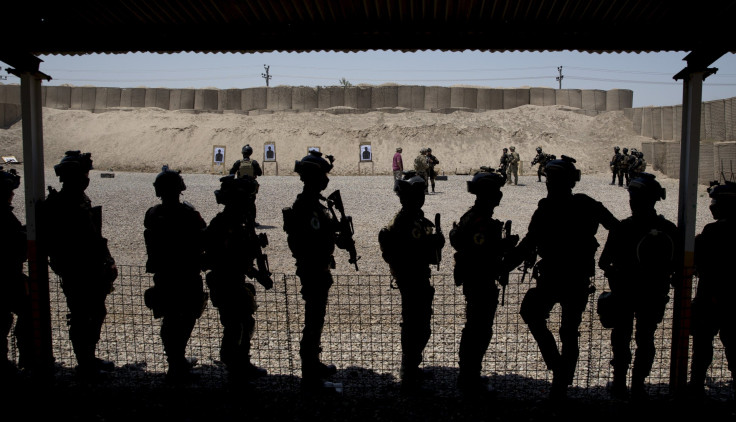US To Send Military To Frontline In Anbar Province, Iraq, To Support Iraqi Troops In Fight Against ISIS

The U.S. is planning to send military advisers and special forces to front lines in Iraq in an effort to speed up the fight against the Islamic State group, Pentagon officials said Tuesday. Key battleground cities such as Ramadi, in the country’s western Anbar province, are the target of proposals to change U.S. strategy, the first time the U.S. has considered putting American soldiers in the line of fire since the country began assisting the Iraqi government last year. The new policy comes at a time when Iraqi security forces have stalled in their battle against Islamic State militants.
The focus of the plan is recapturing Ramadi, which the Islamic State group, commonly known as ISIS or ISIL, took over in May, with the help of wealthy Sunni tribesmen. The loss of this strategic capital gave ISIS the upper hand against the U.S.-backed Iraqi army, something Iraqi forces have tried, and so far failed, to win back. The U.S hopes that its front-line efforts will be rewarded with territorial gains at the Islamic State group's expense.
“We are willing to continue providing more enabling capabilities and fire support to help our Iraqi partners succeed [against the Islamic State group],” said Secretary of Defense Ash Carter in an Armed Services Committee hearing Tuesday. “However, the Iraqi government and security forces will have to take certain steps militarily to make sure progress sticks.”
If Iraqi soldiers take back Ramadi from ISIS, analysts say, they can more easily control the entire Anbar region. Iraq’s security forces have planned a major assault on the city since taking back Tikrit from the terrorist group in April. The offensive was slated to begin this summer, but the training program, spearheaded by U.S. military advisers and Iraqi military officials, took longer than expected. Several thousand soldiers within the military set up a perimeter around the city from which to launch small-scale offensives against ISIS, but haven't seen real gains.

Coalition airstrikes in Iraq have not been effective because the U.S. has wanted to avoid collateral damage, Daniel Serwer, an expert on Iraq and Syria at the Middle East Institute, a think tank in Washington, told International Business Times. There is also an element of miscommunication that's limiting an advance by Iraqi troops. Shiite fighters with the Popular Mobilization Committee in Tikrit in April said they never knew when or where the airstrikes would fall, which prevented them from moving into new territory to fight ISIS.
For the past year, Iraqi security forces, along with the Popular Mobilization Committee, the Shiite volunteer fighters that are largely supported by Iran, have failed to coordinate their fighting and defeat ISIS in key areas. In April, IBT embedded with the soldiers in Tikrit, and reported on the chaotic structure of the offensives and the lack of communication.
Gen. Joe Dunford, chairman of the Joint Chiefs of Staff, said the new plan would aim to fix that. If U.S. special forces are on the front line, they could not only call in airstrikes, but pass on intelligence to soldiers on the ground, closing the communication gap. But more than anything, analysts say, the embedding of U.S. troops on the front line could improve the accuracy of airstrikes, which could make a significant difference in combating ISIS.
"We have needed better targeting in Iraq for quite some time, that is clear," Serwer said. "This plan would not only improve the accuracy of American bombing, but it would enable it."
The U.S. is planning to have a limited amount of special operation forces and military advisers embed with Iraqi forces on the front line to ensure the logistics there are effective, intelligence is accurate and arms are delivered to the Sunni tribes efficiently, Dunford said Tuesday. According to his briefing, the plan would make fighting on the front line more efficient, a boost the Iraqi soldiers have needed since the rapid expansion of ISIS in 2014.

When the U.S. first introduced the plan to fight ISIS in Iraq, Baghdad "rejected any boots on the ground," said Iraqi Foreign Minister Ibrahim al-Alshaiqer al-Jaafari at a recent event in Washington. "We said that [the U.S. fight] has to be done in coordination with the Iraqi military and that the air force has to target ISIL and stay away from residential areas, civilian targets, and they had to coordinate with the Iraqi military."
Now, after months of strenuous battle with ISIS in the west, Baghdad is looking to the U.S. for help. The central government has found it difficult to coordinate fighting with the Sunni tribes that rule the region, hindering progress. Many of the soldiers fighting with Iraqi security forces are Shiite Muslims, and the Sunni Muslims in Anbar do not trust them or the Shiite fighters in the Popular Mobilization Committee. Ethnic and religious tensions have prevented Sunni tribes from garnering the weapons they need to take on ISIS in Ramadi. Many have accused the central government of hoarding weapons in Baghdad.
“We need to see more in the direction of multi-sectarian governance and defense leadership,” Carter said, adding the U.S. would continue to provide weapon support, but "the Iraqi government must ensure it is distributed effectively," he said. "If local Sunni forces aren’t sufficiently equipped, regularly paid and empowered as co-equal members of the Iraqi security forces, ISIL’s defeats in Anbar will only be temporary."
U.S. policy in Iraq is to send arms directly to Baghdad and allow the Iraqi military to distribute them to different fighters across the country accordingly. But tensions remain between the central government and various religious and ethnic factions, including the Kurds and the Sunni tribes. Distribution has been slow as the Iraqi government works to recruit and train fighters before arming them. The U.S. has also been helping to train fighters with the aid of military advisers.

The first U.S. troops to enter the fight against ISIS militants arrived in November. President Barack Obama sent 1,400 of them to Anbar to help the Iraqi military plan the fight against the extremist group, which had already taken over more than 80 percent of the province. Hundreds of U.S. troops, stationed at Al Asad Airbase, have been training Iraqi soldiers over the past year. At the same time, U.S. troops are trying to build up a Sunni-dominated national guard made of tribesmen; several hundred Sunni tribesmen have been trained alongside U.S. military advisers, and thousands of others by the Iraqi military.
But the introduction of U.S. troops on the front line could anger the Shiite forces that are largely backed by Iran, a country that is currently countering the U.S. fight in neighboring Syria by propping up President Bashar Assad.
"I have seen some signs that there are a few battalions [in the Popular Mobilization Committee] that are opposed to the plan," said Alireza Nader, an expert on Iranian relations in the Middle East at RAND Corporation, a global think tank.
U.S. military advisers in Iraq are already pushing ahead, however. Last week, U.S. special forces and Kurdish Peshmerga soldiers conducted an operation to free 70 hostages held by ISIS in a prison north of Hawija, a town southwest of Kirkuk in Iraqi Kurdistan. Master Sgt. Joshua Wheeler, a U.S. military adviser, was killed in the operation. Carter said Tuesday that he expected the U.S. to launch similar raids in the future.
The U.S. special forces would not hold a direct combat role, but if its advisers are embedded on the front lines, Dunford said the U.S. “won’t hold back from supporting capable partners in opportunistic attacks against ISIL.”
© Copyright IBTimes 2024. All rights reserved.




















